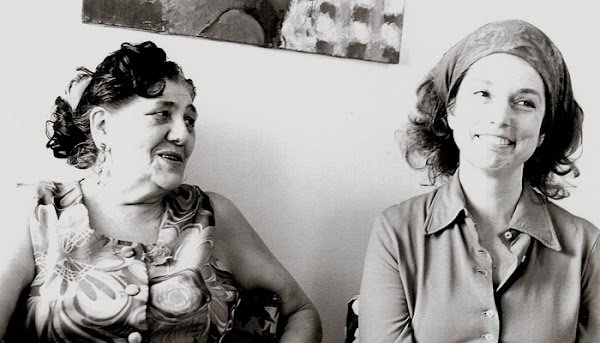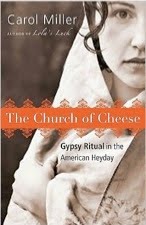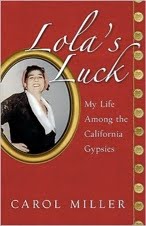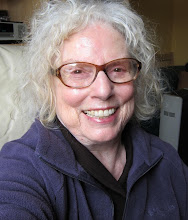My brother has bathroom light on the first floor of his house that he says he hasn't changed for fifty years. We had been talking about lights when he mentioned his everlasting light bulb and praised the genius of big business and American corporations, like GE, who made it. John is very pro-corporation.
My reaction was somewhat different. If corporations can manufacture such wonderfully powerful bulbs, it seems to me rather cavalier of GE and negligible of the public good that they fail to do so. (Of course, lights bulbs that burn for fifty years would markedly reduce future sales.)
I adore my brother. He keeps me stretched in the worldly direction, not least because I am required to consider beliefs and opinions outside my comfort zone.
Thursday, May 26, 2011
Thursday, May 19, 2011
Rose's Indiscretion
Last week, a voice from the past. The call was from a Machvano whose wife's ofisa was once just two blocks from my San Francisco apartment. While reading Church of Cheese, he had been reminded of his aunt Rose's hard life. "So sad,' he said. "And that's all true; I know those stories." Then he added, "You're a writer and you have to write true stories."
A compliment, surely. A half century ago when I first met Machvaia, they were still smarting from the Marlene Dietrich movie "Golden Earrings" and told me that Outsiders knew "nothing true" about Gypsies. But how can Machvaia be portrayed accurately or fairly in consideration of their secretiveness and the stringency of a social structure that defines any cross-culture contact, other than the economic, as criminal?
Then I remembered that Rose had been married to an Outsider, a Gadzo, and publishing her story in a book was no different than broadcasting it at a slava or a wedding, sacred times when the ideal of seeing one another in the goodly way is the appropriate format. Stories, like Rose's, are shames when they become public knowledge. The Machvano caller was Rose's kinsman, which meant he shared her bloodline shame. Through the usual gossip hotline, many had undoubtedly heard about Rose's indiscretion. And more had suspected. But as an eyewitness author, I had given her error the full credit of black and white, irreversible, print.
Charley was kind enough to admit Rose's story was true. But his statement, "You have to write true stories," suggests that he wanted to believe I was required, by the necessities of my craft, to betray him.
A compliment, surely. A half century ago when I first met Machvaia, they were still smarting from the Marlene Dietrich movie "Golden Earrings" and told me that Outsiders knew "nothing true" about Gypsies. But how can Machvaia be portrayed accurately or fairly in consideration of their secretiveness and the stringency of a social structure that defines any cross-culture contact, other than the economic, as criminal?
Then I remembered that Rose had been married to an Outsider, a Gadzo, and publishing her story in a book was no different than broadcasting it at a slava or a wedding, sacred times when the ideal of seeing one another in the goodly way is the appropriate format. Stories, like Rose's, are shames when they become public knowledge. The Machvano caller was Rose's kinsman, which meant he shared her bloodline shame. Through the usual gossip hotline, many had undoubtedly heard about Rose's indiscretion. And more had suspected. But as an eyewitness author, I had given her error the full credit of black and white, irreversible, print.
Charley was kind enough to admit Rose's story was true. But his statement, "You have to write true stories," suggests that he wanted to believe I was required, by the necessities of my craft, to betray him.
Tuesday, February 22, 2011
At the zoo
A sunny winter Sunday at the zoo and nearly everyone is here with children. These are young children, a good share of them traveling on a parent's hip or in a stroller. Encountering the Macaque exhibit, some like to scream with fear and excitement, but most just stare in amazement at the wonder of being new to this world. School is out today; where are their older siblings? Does enthusiasm for viewing caged animals in the company of one's devoted parents fade just a few years short of Middle School?
Many of these children old enough to talk are speaking Spanish. Or is that Spanish? Picking words out of the air, I try to guess their meaning. Presidents Day is United Nations day at the zoo, and fuels my linguistic resolve. I promise, in my next life, to become fluent in at least three languages, an enterprise best begun, of course, at the age of my Kinder-pal zoo associates. In the Siamang area, against a background of hoots and shrieks, I come upon a large extended family taking pictures and giving directions in what they assure me is Czech.
I meet a young and pretty woman who is a student in something like behavioral biology; she sits on a bench and takes copious notes of orangutan activity. The lady orang grooms her hefty orang consort, happily chewing whatever she is finding in his fur. Although the male is facing away, the female, her round face vulnerable and tender, glances, on occasion, toward the parents and children assembled just beyond the glass. It crosses my mind that the other apes, the gorillas and chimpanzees, being genetically closer to our Homo sapiens species, never appear quite so benignly naive.
Further on, a father tries to hold his unhappy toddler daughter on a fence and take her picture. I volunteer and, while suspecting the background and the elephant are totally out of range, shoot the two of them with the father's cell phone. Many decades ago, I worked as a camera "girl" at the Hyatt in SF's Embarcadero. The camera was quite large, strapped over my shoulder and braced across my lower arm. The results, as I recall, were invariably vivid, flattering, pleasing, and easy to market, particularly on holidays and birthdays. I would race to the lower hotel level to get the film developed and return with a stack in a variety of sizes.
When these children are grown, more foreign to them than the languages I now hear around us will be the concept of developing film, film itself, and even the retro possibility of taking a picture with a single function camera.
Many of these children old enough to talk are speaking Spanish. Or is that Spanish? Picking words out of the air, I try to guess their meaning. Presidents Day is United Nations day at the zoo, and fuels my linguistic resolve. I promise, in my next life, to become fluent in at least three languages, an enterprise best begun, of course, at the age of my Kinder-pal zoo associates. In the Siamang area, against a background of hoots and shrieks, I come upon a large extended family taking pictures and giving directions in what they assure me is Czech.
I meet a young and pretty woman who is a student in something like behavioral biology; she sits on a bench and takes copious notes of orangutan activity. The lady orang grooms her hefty orang consort, happily chewing whatever she is finding in his fur. Although the male is facing away, the female, her round face vulnerable and tender, glances, on occasion, toward the parents and children assembled just beyond the glass. It crosses my mind that the other apes, the gorillas and chimpanzees, being genetically closer to our Homo sapiens species, never appear quite so benignly naive.
Further on, a father tries to hold his unhappy toddler daughter on a fence and take her picture. I volunteer and, while suspecting the background and the elephant are totally out of range, shoot the two of them with the father's cell phone. Many decades ago, I worked as a camera "girl" at the Hyatt in SF's Embarcadero. The camera was quite large, strapped over my shoulder and braced across my lower arm. The results, as I recall, were invariably vivid, flattering, pleasing, and easy to market, particularly on holidays and birthdays. I would race to the lower hotel level to get the film developed and return with a stack in a variety of sizes.
When these children are grown, more foreign to them than the languages I now hear around us will be the concept of developing film, film itself, and even the retro possibility of taking a picture with a single function camera.
Saturday, January 29, 2011
Moving
I love this packed-in Wallingford neighborhood with water views of Lake Union and the canal. Today, I drove slowly down my street, cars on both sides as always, waited for Debra's Penske van to get situated, and then parked carefully in my minimal garage space. Driving, parking where I live is always a tight squeeze and I see the moving van is a bit of a walk from the front door for the movers. I meet Debra in the hall; she says she is moving to a house in West Seattle.
The little rental moving van reminds me of Mill Valley and how we Marinites would try to warn the monster trucks that store a dozen households' belongings before they could turn onto the twisty, narrow Mt. Tamalpais roads and get stuck in the redwoods. As the vans lumbered by, I would wave my arms and shake my head from side to side, which is "No" in sign language. I lived in the flat, flood-prone part of town, on camellia-lined Miller Avenue, and within walking distance of The Book Depot. Other people lived on the mountain, and I never discovered how they got up there, and left, with all their stuff.
I have lived in a number of places and, for me, the perfect situation would involve the civil amenities of relative quiet, clean and healthy air, and a variety of songbirds, combined with fun urban things like great restaurants, museums, and lots of interesting people to meet and things to do. I settle for some part of this picture.
The little rental moving van reminds me of Mill Valley and how we Marinites would try to warn the monster trucks that store a dozen households' belongings before they could turn onto the twisty, narrow Mt. Tamalpais roads and get stuck in the redwoods. As the vans lumbered by, I would wave my arms and shake my head from side to side, which is "No" in sign language. I lived in the flat, flood-prone part of town, on camellia-lined Miller Avenue, and within walking distance of The Book Depot. Other people lived on the mountain, and I never discovered how they got up there, and left, with all their stuff.
I have lived in a number of places and, for me, the perfect situation would involve the civil amenities of relative quiet, clean and healthy air, and a variety of songbirds, combined with fun urban things like great restaurants, museums, and lots of interesting people to meet and things to do. I settle for some part of this picture.
Saturday, January 1, 2011
Green Lake
December 31, 2010 is a rare and fair, cold and sunny, day. Bare trees lace their arms against the sky and the choppy water of the city lake shivers itself blue. My face and ears are freezing cold and I envy the bearded chaps with puffs of hair on their faces for insulation. Above, a helicopter rotors a distant background rumble as I overhear bits of conversations, "symphony," "ashram," "wrong color," "Keep doing it." To me, Green Lake is the center of the city, the place to go to see the Seattle people, and sometimes you even see your friends.
Everyone, child, adult, pram, and bicycle, passes me by. Dogs in sweaters, hats, outfits, dogs are part of the parade. Runners' shoes thump on the pavement, and the air disturbance shoots a few zippy, trippy endorphins in my direction. Maybe that is what keeps me going, walking as fast as I can.
Nowadays, no one walks with me; I am slow. With increasing neuropathy, I attend to my stride and the ground ahead, doing the best I can. In the past, my sisters, sometimes all three of them, walked with me. Many years ago, we sometimes saw our father, in his eighties, running. For some reason, he wasn't supposed to run, so we hid or pretended we hadn't seen him. Even yet, a ghost of that memory will trot him past the outside corner of my eye.
The sun is out at Green Lake. Next time, I'll bring my ear muffs.
Happy 2011.
Everyone, child, adult, pram, and bicycle, passes me by. Dogs in sweaters, hats, outfits, dogs are part of the parade. Runners' shoes thump on the pavement, and the air disturbance shoots a few zippy, trippy endorphins in my direction. Maybe that is what keeps me going, walking as fast as I can.
Nowadays, no one walks with me; I am slow. With increasing neuropathy, I attend to my stride and the ground ahead, doing the best I can. In the past, my sisters, sometimes all three of them, walked with me. Many years ago, we sometimes saw our father, in his eighties, running. For some reason, he wasn't supposed to run, so we hid or pretended we hadn't seen him. Even yet, a ghost of that memory will trot him past the outside corner of my eye.
The sun is out at Green Lake. Next time, I'll bring my ear muffs.
Happy 2011.
Subscribe to:
Posts (Atom)



